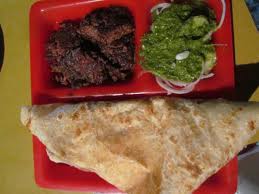Top Qs
Timeline
Chat
Perspective
Tunde ke kabab
Minced meat dish associated with Lucknow, India From Wikipedia, the free encyclopedia
Remove ads
Galouti kebab, is a dish made out of minced meat strongly associated with the city of Lucknow, India.[1] It is a part of Awadhi cuisine. It is said to incorporate 160 different spices.[2] Ingredients include finely minced buffalo meat,[3][4] plain yogurt, garam masala, grated ginger, crushed garlic, ground cardamom, powdered cloves, melted ghee, dried mint, small onions cut into rings, vinegar, saffron, rose water, sugar, and lime. Galouti Kebab was popularised by the Nawab of Awadh Wajid Ali Shah of Lucknow.[5] Lucknow restaurant Tunday Kababi, started in 1905, is famous for serving buffalo meat galouti kebab.[6][7]
In India, due to dietary and religious restrictions, galouti kebab is also made with minced mutton and minced chicken with a variety of assorted spices and ground millet for binding. It is generally fried in ghee, though any other fat may be used also.
Remove ads
Origin
During the 17th century, in the Awadh state under the Mughals in Northern India, one of the members related to the Nawabs of Awadh held a competition for the Khansamahs to prepare kebabs as soft as possible to chew. One of the khansamah, Murad, who was also tunda (one-armed), prepared the dish using at least 100 Indian and exotic spices including some aphrodisiacs. The Nawab found the kebabs so delicious that he immediately declared Murad the winner. Eventually the kebabs became so popular in Awadh and other Mughal courts that it came to be known as tunday ke kebab, literally meaning 'one-armed man's kebabs'.[8][9]
The dish, derived from the Hindi-Urdu word galawati (गलौटी / گلوٹی), meaning "thing that melts", referring to its softness.[10]
Remove ads
See also
References
External links
Wikiwand - on
Seamless Wikipedia browsing. On steroids.
Remove ads

